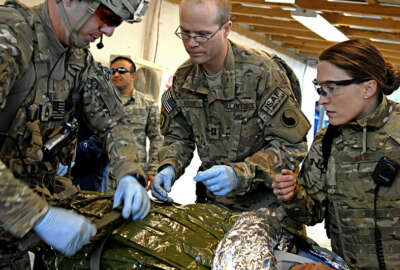Exclusive
DHA’s updated plan to resize Military Health System is similar to pre-pandemic strategy
The strategy comes after DHA was forced to rethink its path forward after the COVID-19 pandemic showed stress in some private health care networks and forced some...
The Defense Health Agency’s current plan is to “right size” the Military Health System by moving about 200,000 TRICARE beneficiaries to private medical networks and close less than 7% of the Defense Department’s military treatment facilities.
The strategy comes after DHA was forced to rethink its path forward after the COVID-19 pandemic showed stress in some private health care networks and forced some clinics to close. Despite those variables, DHA for the first time is confirming that the readjusted plan is currently still similar to the pre-pandemic expectations.
“We’ve finished that report and submitted the draft report up to Congress through the Secretary of Defense,” Dr. Brian Lein, DHA’s assistant director of healthcare administration told Federal News Network. “Congress asked several follow on questions that we are in the process of answering, and so no decision has been made from that report, either within the Secretary of Defense’s office, or within Congress giving us the authority to move in any way. We’re constantly relooking and ensuring that any of the assumptions or facts at that time haven’t changed.”
Congress asked DoD to realign its Military Health System five years ago. The plan, at the most, considered moving as many as 1.9 million people from the Military Health System. It is also related to a DoD plan to cut thousands of medical billets.
DHA is taking into account a new DHA-funded study that stated patients who move away from military hospitals will get worse inpatient care.
“The results of this study show that ongoing healthcare reforms stemming from an organizational overhaul of the Military Health System in 2016 could result in significant harm to patients,” the authors of the study wrote in the report obtained by Federal News Network. “Available evidence suggests that limiting access to MTFs could decrease the quality-of-care for active-duty service members, their families, and military retirees. Repeated assessments of systemic and hospital quality by the U.S. government and American College of Surgeons point toward comparable performance between the Military Health System and some of the country’s top health-systems”
Lein said that the study is a compliment to the skill nested in the Military Health System, however, he took some issue with the results in that it only took into account inpatient care.
“I think that if we look at both inpatient and outpatient care, and we look at a much lower percentage [of people moving away from military care], that perhaps some of the findings in the paper may be less valid than what was what was reported,” he said. “That being said, we do engage our managed care support contractors on a monthly basis on quality and safety metrics, from the managed care that is being provided out in our network. Over the course of the last year, we have instituted multiple formal meetings, not just with the two large managed care support contractors, but the U.S. Family Health Plan and some of our other managed care teams. We asked them to be part of a quality consortium across the military health care system where we’ve all agreed to various metrics that we’re going to look at and improve on as a military healthcare system.”
The study looked at moving 10%, 20% and 50% of the TRICARE population to private care.
Lein said the areas where DHA is considering downsizing are places where there are robust medical communities outside of the military system.
Congress sold the right-sizing plan as the most sweeping overhaul of the system in a generation that would better readiness, health and cost.
DoD has had concerns about the plan in the past, however.
A DoD report sent to Congress in February 2020 laid out some issues that the downsizing might create, including making some bases less desirable, forcing troops to take off work to escort family members to health services off base and possible issues in finding standardized care for women.
DoD outlined mitigation strategies in the report, like providing alternative transport strategies for family members.
Copyright © 2025 Federal News Network. All rights reserved. This website is not intended for users located within the European Economic Area.
Scott Maucione is a defense reporter for Federal News Network and reports on human capital, workforce and the Defense Department at-large.
Follow @smaucioneWFED







